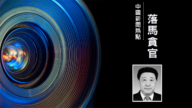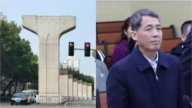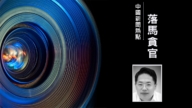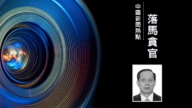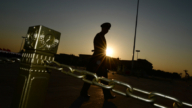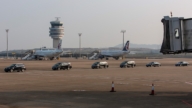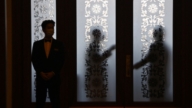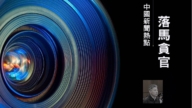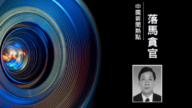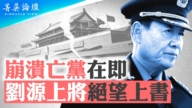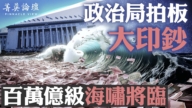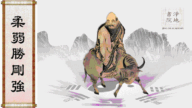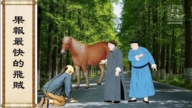【新唐人2012年9月3日訊】一份有關中共十八大高層的人事表,和政府機構改革方案的討論稿,最近在網上流傳,為前途未卜的十八大佈局,再添新鮮話題。人事表中,習近平赫然列為軍委主席,而討論稿則放出重大消息說,中央打算將現有的國務院機構削減三分之一,也就是27個國務院部委縮減到18個大部委。外界認為,國務院如果作出如此罕見的大調整,很有可能是溫家寶卸任前的最後一擊重拳。評論同時指出,雖然是大幅度改革,但中共體制不變,任何改革也沒甚麼實質意義。下面請看分析報導。
根據《博訊網》傳出的十八大佈局人事表,習近平擔任新任國家主席和軍委主席,李源潮兼任副主席及中央書記處第一書記,總理李克強,中紀委書記汪洋擔任,此外俞正聲為委員長,張德江為政協主席,王岐山為第一副總理。列入十八大政治局委員名單的包括劉延東,張高麗,孟建柱,劉源,令計劃,胡春華等。
這份人事表的結果,與之前盛傳的「胡錦濤連任軍委主席」的消息截然不同。歷史學教授,「中國社會民主黨中央委員會」主持人劉因全認為,如果胡錦濤不尋求連任,說明新交接的領導班子符合胡錦濤的意願,另外一個原因就是,胡錦濤不願與前任軍委主席江澤民一樣,留下戀權的罵名。
「中國社會民主黨中央委員會」主持人 劉因全:「他(胡錦濤)就是要區別江澤民,因為江澤民(以前)提出再擔任軍委主席,在整個國內,黨內,在國際上,在以後的評論上留下了很惡劣的影響。大家對這件事情有很多批評。胡錦濤有可能接受江澤民的教訓,不再連任軍委主席了。」
消息人士還在海外網站上透露,國務院現有的27個部委機構將大幅度合併,事業單位根據職能,一部分轉變為企業或民間團體,一部分則轉變為行政機關,併入政府組成部門。如:發改委將被取消部分審批職權;科技部併入教育部;鐵道部併入交通運輸部;計生委與衛生部合併;港澳辦與僑辦併入民族事務委員會;人民銀行不再屬於國務院,而是獨立的國家機構,與最高檢、最高法平級等等。
其中對國家安全部的調整引起外界關注,國安部降格為國務院直屬機構,改為國家安全總局。劉因全對此表示懷疑,他認為,中共不可能削弱國家安全部。
劉因全:「目前中共現在的體制下,為了維護自己的統治,為了強化自己的統治,為了同美國和其他國家情報方面的優勢,削弱情報部門的可能性很小。」
這份大部制討論稿聲稱,改革的核心是轉變政府職能,以市場經濟宏觀調控、社會服務與管理為主。目地是要解決政府部門機構重疊、職權交叉、政出多門的矛盾,提高行政效率。外界猜測,政府高層機構這一大幅度改革,很可能是溫家寶卸任前的一次大動作。
但民間輿論認為,大部制改革的意義不大。
「中國公民監政會」發起人 郭永豐:「 中共不管他東改西改,也就是變花樣,變甚麼花樣就是換湯不換藥。怎麼換本質是沒變,腐敗分子反腐敗肯定沒用,怎麼變有甚麼意義。」
「中國公民監政會」發起人郭永豐指出,中共拒絕人民的監督,不公布財產,還妄想權力代代世襲。現在老百姓也不那麼傻了,再不會相信中共了。
採訪/劉惠 編輯/許旻 後製/周天
Hu Jintao may not become military leader; State Council will
reduce agency number by 1/3, says unconfirmed Internet news
Recently an unconfirmed list of politburo members of
18th Congress and a draft plan of ministry reform was widely spread on the Internet,
which became another hot topic on the unsettled
personnel arrangement of the 18th Congress.
According to the list, Xi Jinping will serve as the new
Chairman of the Central Military Commission.
At the same time, the draft plan on ministry reform
revealed the State Council will reduce the number of its departments and agencies by one third, i.e. from 27 to 18.
Some outsiders speculate that such reform is possibly the
last significant move of Wen Jiabao before he steps down.
There are also remarks pointing out that there is no use
of any kind of reform if the Chinese Communist Party (CCP) regime won’t change.
According to an unconfirmed list of politburo members
of the 18th Congress by Boxun.com,
Xi Jinping will become the new President and Chairman
of the Central Military Commission.
Li Yuanchao will be the vice president and first-ranked
member of Secretariat of the CCP’s Central Committee.
Li Keqiang will be the premier and Wang Yang will be the
Secretary of the Central Commission for Discipline Inspection.
And Yu Zhengsheng will serve as
Chairman of Standing Committee,
Zhang Dejiang as Chairman of
People’s Political Consultative Conference.
Wang Qishan will be Deputy Premier of the State Council.
The list also includes Liu Yandong, Zhang Gaoli,
Meng Jianzhu, Liu Yuan, Ling Jihua, Hu Chunhua as the new politburo members of the 18th Congress.
Such personnel arrangements are completely different
from a previous prediction which said Hu Jintao will stay as Chairman of the Central Military Commission.
History professor and moderator of the Social Democratic
Party of China Central Committee Liu Yinquan believes that
Hu must be satisfied with the new CCP leader group
if he doesn’t attempt to be re-elected;
He doesn’t want a bad reputation of clinging to power
like Jiang Zemin.
(Liu Yinquan, moderator of the Social Democratic Party of
China Central Committee): “He (Hu Jintao) wants to distance
himself from Jiang Zemin who had a considerably negative
effect both inside and outside China.
Jiang insisted on staying as the military leader for another
two years. There are numerous criticisms on Jiang’s act.
Therefore Hu might learn from this and
won’t succeed himself as Chairman of the Central Military Commission.”
Some sources also revealed on foreign websites that
the State Council will merge many of the
current 27 governmental departments or agencies.
Some will become company of civil groups according
to their functions and others will be merged into other departments as an administrative body.
E.g. the National Development and Reform Commission
will lose part of its approval powers.
The Ministry of Science and Technology will be merged
into Ministry of Education,
the Ministry of Railways merged into
the Ministry of Transport,
National Population and Family Planning Commission
merged into the Ministry of Health,
the Hong Kong and Macao Affairs Office and
the Overseas Chinese Affairs Office merged into the State Ethnic Affairs Commission.
The People’s Bank of China will no longer be subject
to the State Council and
become an independent governmental agency of
the same rank as the Supreme People’s Procuratorate and the Supreme People’s Court.
Among the anticipated changes, the adjustment on the
Ministry of State Security has drawn most attention.
It will be relegated to a department affiliated to
the State Council as “State General Administration of State Security”.
Liu Yinquan casts doubt on such prediction because he
doesn’t believe that the CCP would weaken the ministry.
(Liu Yinquan):”Under the current CCP’s regime,
it will try its best to strengthen its governance and hold its power.
To compete with the United States and other countries, it is
not possible for it to weaken the intelligence department.”
A discussion draft on such super ministry reform
claimed that
the reform mainly aimed at making governmental
functions focus more on social service and
administration and macroeconomic control
on the market economy.
The reform will try to solve the problem of power
overlapping between different governmental departments and agencies and enhance administrative efficacy.
It is speculated this reform may be the last significant
move of Wen Jiabao before he leaves.
However, many civilians said they wouldn’t expect
much from the reform.
(Guo Yongfeng, founder of Chinese Citizen Monitoring
Association):”Whatever kind of reforms the CCP carries out,
they are all superficial which will never change its evil nature.
Corruptionists will never really suppress corruptions
so there is no use to all those changes.”
Guo Yongfeng remarked that the CCP leaders
had refused to be monitored by the Chinese people or declare their wealth;
they even attempted to pass the power
to their descendants generation after generation.
However, the good news is that many Chinese civilians
have been awakened and refused to trust the CCP anymore.


